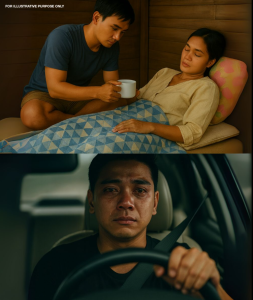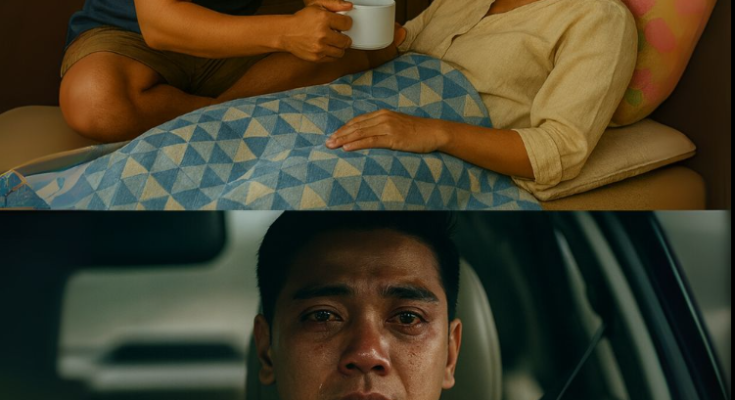The Ten Days That Changed Everything
When my wife, Elena, became paralyzed after the accident, our lives stopped in ways we never imagined. The house fell silent — not because we didn’t speak, but because every word carried weight. Every sound of her wheelchair moving down the hallway reminded me of how fragile everything had become.
For four months, I tried to be strong. I told myself that love was patient, that vows meant something. But in the quiet hours of the night, when her breathing slowed and I lay beside her, guilt and frustration twisted inside me like wires. I missed the laughter, the touch, the effortless affection we once shared. And I hated myself for missing it.
Then came Nora — my colleague’s younger sister. She was light where my days had turned heavy, curious where my world had grown predictable. She would stop by the office sometimes, bringing her brother lunch, always smiling at me in that open, easy way that made me feel seen again.
It started innocently: coffee breaks, small talk, moments that felt harmless. But one day, when she asked me if I wanted to join her for dinner, I said yes before my conscience could protest. I told myself I deserved one evening to breathe. One evening without wheelchairs, medications, or hospital bills.
That single evening stretched into ten days.
Ten days of distraction, of escaping the walls of responsibility that had begun to feel like a prison. Ten days of pretending that I wasn’t someone’s husband, someone’s caretaker, someone drowning in guilt.
But the tenth day changed everything.
It was raining when I came home. The house smelled faintly of lavender and medicine — the scent that had become the background of our lives. I expected to find Elena in her chair by the window, but she wasn’t there. The nurse told me she had asked to be alone for a while.
When I walked into our bedroom, she was sitting up, her hands folded in her lap, her eyes steady on me.
“You’re back,” she said quietly.
Her voice was calm — too calm. I felt my stomach tighten.
“Yes,” I said, trying to sound casual. “I just needed to clear my head.”
She looked at me for a long time, the kind of look that cuts through every excuse. Then she said something I will never forget:
“I don’t need you to explain where you were. I just need to know if you still want to be here.”
The words struck harder than any accusation. She wasn’t angry. She wasn’t pleading. She was simply asking if I still chose her — even like this, broken but breathing.
I couldn’t answer. My silence was confession enough.
She nodded slowly. “That’s what I thought,” she whispered.
Then she turned her wheelchair toward the window. And for the first time since the accident, she didn’t ask me to help her. She didn’t need to. The distance between us had already become greater than any physical space.
That night, I sat in my car for hours, listening to the rain beat against the windshield. Nora called, but I couldn’t bring myself to answer. Everything that had felt thrilling suddenly felt hollow. What had I really been searching for? Not love. Not lust. Just an escape from the guilt of watching the woman I loved suffer while I stood powerless.
The next morning, I walked into the hospital where Elena had done her rehabilitation therapy before she came home. I spoke to her old doctor and asked how I could help her more effectively — not out of penance, but out of love.
The doctor said something simple: “Don’t treat her like she’s already lost. People heal differently — sometimes not in the body, but in the heart. And you can be part of that healing, or part of the wound.”
Those words stayed with me.
When I returned home, I found Elena by the piano. She couldn’t play like she used to, but her fingers moved softly across the keys, remembering melodies her body could no longer express. I sat beside her, unsure if I had the right.
After a moment, I said, “I made a mistake. I ran because I was afraid — not of you, but of who I was becoming.”
She didn’t speak. I thought she would ask me to leave. Instead, she said quietly, “Then stop running.”
That was the beginning of our real recovery — not hers, but ours.
The days that followed weren’t easy. Guilt doesn’t vanish because of apologies, and forgiveness doesn’t arrive like lightning. It comes in small gestures: the way she allowed me to feed her without turning away, the way she began to smile again at my clumsy jokes.
I started reading to her in the evenings — old novels we both used to love. We laughed at lines we’d memorized years ago. There were moments of silence that still carried sadness, but they were no longer unbearable.
And in those moments, I realized something profound: intimacy isn’t defined by touch. It’s the willingness to stay. To show up when everything feels broken.
Weeks later, one of the therapists told me that Elena was responding better to treatment. Slowly, she was regaining movement in her hands. Watching her lift a cup again for the first time, trembling but determined, felt more powerful than any pleasure I’d ever chased outside our home.
She caught me watching and said softly, “You didn’t believe I could come back, did you?”
I smiled through tears. “I didn’t believe I could.”
She reached out her hand — weak but warm — and said, “Then let’s come back together.”
Looking back, those ten days of betrayal remain the darkest chapter of my life, but they also taught me something I might never have learned otherwise: love isn’t about perfection. It’s about endurance. It’s about seeing someone at their lowest and still choosing to stay.
We are human — flawed, frightened, and fragile. But sometimes, the weight of our mistakes can forge something stronger than what existed before.
Ten days almost destroyed us. But they also reminded me that the truest form of love is not found in passion, but in persistence.
And so, day by day, we began again — not as we were, but as two people learning to love without conditions, without fear, and without running away.

